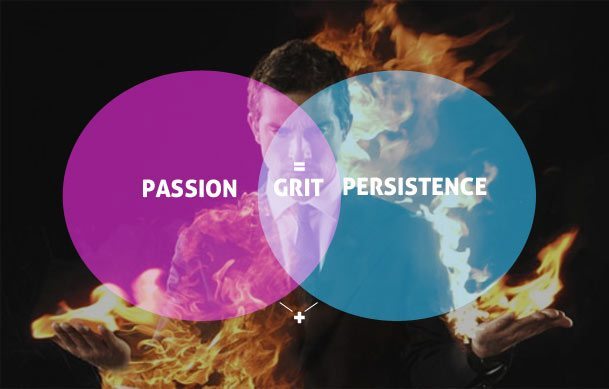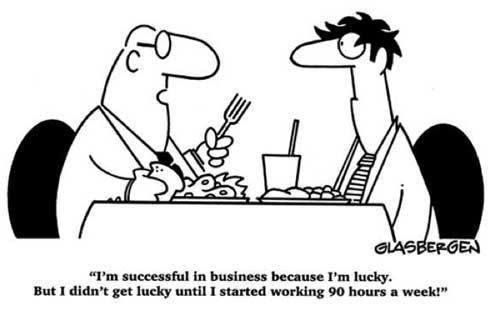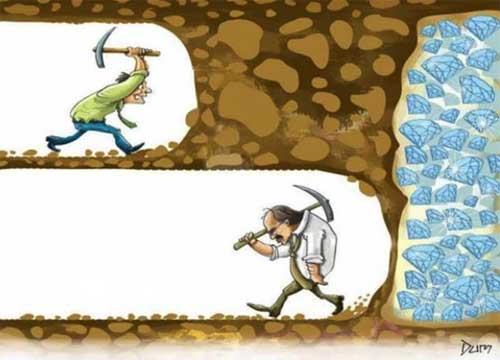Success Advice
4 Ways Successful People Use Grit to Achieve Success

Why is it that some people seem to be destined to succeed at whatever they do, where others are prone to underachievement and failure?
How is it that some people are able to plough through the challenges of life, where for others the same barriers are unsurmountable?
Can the factors of greatness be learned, or are they something you’re either born with or not?
These, my friends, are the important questions in life. Within those questions lie the keys to unlocking a person’s potential and living an exceptional life. And the answer is all about MINDSET.

Image Credit: Randy Glasbergen
Many psychologists and behaviourists have been studying and searching for answers to those questions seemingly since the dawn of time. For many years, their work concluded that the fundamental factors of success lie in intelligence and talent. This conclusion is reflected not only in our reliance on intelligence and aptitude testing as the primary means of distinguishing the best candidates for various jobs or roles, but also in the commonly held expectation that success will naturally come to those who are smarter and more gifted than the rest of us.
However, many studies of extraordinary people throughout time, be it inventors, business owners, self-made billionaires, or leaders in their field, draw contradictory conclusions.
Research initiated by a Psychologist named Lewis Terman in the 1920’s followed the lives of children with exceptional intelligence, and found that while many went on to become doctors, lawyers, and specialists in various fields earning well in excess of the average wage, not all did so. Approximately one third of those subjects achieved no greater success or prosperity than the average Joe. So how come they did so poorly in life if they were so smart?
Then there is the fact that many of the world’s richest and most successful people were high school and college drop-outs with, frankly, underwhelming aptitude for education.
Take, for instance, Sir Richard Branson. If you had met him in his teens, you wouldn’t have bet on his later success. Richard Branson had poor reading and math skills, dropped out of high-school and is proud to admit he’s been dyslexic all his life. Not really your first choice for a billionaire philanthropist knight and worldwide media icon.
How about Henry Ford, who was born in abject poverty. He never saw the four walls of school but he went on to build Ford Motor Company and become one of the richest men that ever lived. Then consider Thomas Edison, Warren Buffett, Oprah Winfrey, John D. Rockefeller, Martha Stewart, Bill Gates, and so many more.
So how come they did so well in life if they were no more intelligent or talented than the rest of us?
Why the GRIT factor may be the answer
Those questions have been the research focus of Professor Angela Duckworth, who has been investigating the factors beyond intelligence and talent that predict success. She has found conclusive evidence that the strongest predictor of success is a factor she named GRIT. Grit, in her words, is passion and perseverance for very long term goals. Grit is essentially about stamina, and how consistently you work in a certain direction over time.
To use a simple analogy, the measure of a good car is not so much about how new and shiny it is or what it’s top speed is (although those features are nice!), but that it starts every time and gets you reliably and efficiently from point A to point B. Similarly, Duckworth’s research concurs that while intelligence and talent are certainly favourable assets, anyone can be successful if they apply hard work and tenacious, dogged perseverance toward their goal.
Gritty people tend to persevere, self-regulate and push themselves toward success. Drs. Angela Duckworth and Martin Seligman (2006) found that the correlation between self-discipline and achievement was twice as large as the correlation between IQ and achievement.
So the GRIT factor is a critical ingredient to know and learn because the number one reason people don’t succeed at any given pursuit, whether that be career success, health and fitness, or skill mastery etc, is because they GIVE UP.
The most common reason we give up is because we make the premature assumption that our effort isn’t working. Compounding the problem is that in this day of modern technology, the ever increasing speed of information and feedback, and the rapidly reducing span of our attention and interest, we are becoming more and more fixated on instant gratification. And this need to HAVE IT NOW is working directly against grit.
Consider this. Achieving any goal is a lot like following a recipe. Of course you need that recipe to be designed in a way that it will produce good results, but in order to get those results you have to follow the recipe!
When people typically throw their arms in the air and say ‘It’s not working!’, it’s like they’ve beaten the butter and sugar and added the eggs, then complained that the recipe doesn’t work because it’s not a cake yet. The thing is, you may be giving up just moments before you would have started to succeed. So here’s my advice.
Stop dabbling.
Make it serious.
Make a commitment and stick it out until you reach the destination.

4 Ways to get more GRIT
1. Prove to yourself that you can do this
I want you to think of an experience in your life that was really hard at the time, but that you got through.
For instance, I have two things that I recall. One was finishing my three year Doctorate. There were so many times I was in tears ready to quit and feeling that I’d never make it, but eventually it was finished and I graduated. Another was childbirth. At the time you feel that you just can’t endure any more and won’t survive it, but you just do, then eventually it’s over and you’ve made it.
Think of your own experience of making it through an arduous journey. That is your proof that by making a commitment and sticking it out, you can get there.
2. Apply the passion
Passion is a part of the grit equation because if you want to be able to work hard and long at something, you have to really want it. There has to be a deep intrinsic motivator, a fire inside you, that makes this thing worth doing. Otherwise you’re setting yourself up to flake out at the first sign of hardship.
Why is this important to me?
How will this achievement/end result impact me, my life, and those around me?
How can I remind myself of what makes this journey worth taking?
3. Apply the persistence
This is the ‘time to knuckle down’ bit. Dr Duckworth emphasises that it is the consistency rather than intensity of work that counts and represents grit. That means that rather than engaging in a once-off or short term behaviour binge (think of someone pulling an all-nighter of study or consuming nothing but juices for a day), we need to embed consistent, regular, maintainable behaviours that will move us in the direction of our target. That might be one hour of study every night, or a well-balanced healthy diet that fits in with your lifestyle.
Here are a few tips on building persistence:
- Start with something small that you can definitely do on a regular basis (i.e., walking at least once around the block every day rather than aiming for 10km).
- Make it a ‘NOT Negotiable’ in your mind. Regardless how unmotivated you feel, just get it done. Live by this rule – it has to become part of your regular routine.
- Track your progress, and remind yourself what you’re working towards.
4. Repeat
Keep reinforcing your passion, and keep working on your persistence. You can apply this same formula to any other behaviour or outcome you want to manifest.
Remember: you can do it, if you want it bad enough and you keep working hard until you get it.
The fact of the matter is most of the extraordinary people throughout history and most of the people you see in Forbes’ list of richest people in the world had to take enormous risks to get there. That almost always means a lot of failing, and bucket-loads of grit.
I know it’s easy to assume that successful people had something the rest of us didn’t: They had it easy. It’s their parents. They were lucky. They had a better education. They were gifted. But perhaps it’s time we man up and face the music.
The reality is 73 out of the first 100 billionaires in the world are self-made. That’s a Bloomberg fact. Many famous people throughout history had limited education, and possessed average intelligence and talent. There’s no conspiracy going on. They just work harder than you did.
Those self-made billionaires and extraordinary people simply found their passion, applied perseverance, and pushed through obstacle after obstacle until they realised their goal. And the good news is, there’s absolutely no reason you can’t do that too.
Many years ago I made up a quote that I still stand by today:
“If life was meant to be EASY, EVERYONE would be good at it!”.
So let that be a lesson that the universe presents us with challenges so we have the opportunity to overcome them, and to grow from that experience. You don’t get to be one of ‘those successful people’ for nothing. There’s not room for everybody at the top. If you want to rise above, to reach the peak of that mountain and reap the glory that goes with it, then climb.
And don’t stop climbing til you get there.
Angela Lee Duckworth: The key to success? Grit
Business
The Simple Security Stack Every Online Business Needs
Most small businesses are exposed online without realising it. This simple protection stack keeps costs low and risks lower.

Running a business online brings speed and reach, but it also brings risk. Data moves fast. Payments travel across borders. Teams log in from homes, cafés, and airports. (more…)
Business
If Your Business Internet Keeps Letting You Down, Read This
From smoother operations to better security, dedicated internet access is quietly powering today’s high-performing businesses.

Today, a dependable internet service is the bedrock for uninterrupted business operations. Many organizations rely on stable online connections for communication, data transfer, and customer interaction. (more…)
Did You Know
How Skilled Migrants Are Building Successful Careers After Moving Countries
Behind every successful skilled migrant career is a mix of resilience, strategy, and navigating systems built for locals.

Moving to a new country for work is exciting, but it can also be unnerving. Skilled migrants leave behind familiar systems, networks, and support to pursue better job opportunities and a better future for their families. (more…)
-

 News2 weeks ago
News2 weeks agoBrandon Willington Builds 7-Figure Business by Ignoring Almost Everything
-

 Health & Fitness3 weeks ago
Health & Fitness3 weeks agoWhat Minimalism Actually Means for Your Wellness Choices
-

 Did You Know3 weeks ago
Did You Know3 weeks agoWhy Most Online Courses Fail and How to Fix Them
-

 Business3 weeks ago
Business3 weeks agoIf Your Business Internet Keeps Letting You Down, Read This
-

 Business1 week ago
Business1 week agoEntrepreneur’s Guide to Pay Stubs: Why Freelancers and Small Business Owners Need a Smart Generator
-

 Business6 days ago
Business6 days agoThe Salary Shift Giving UK Employers An Unexpected Edge
-

 Business1 week ago
Business1 week agoThe Simple Security Stack Every Online Business Needs
-

 Scale Your Business1 week ago
Scale Your Business1 week ago5 Real Ways to Grow Your User Base Fast





























10 Comments